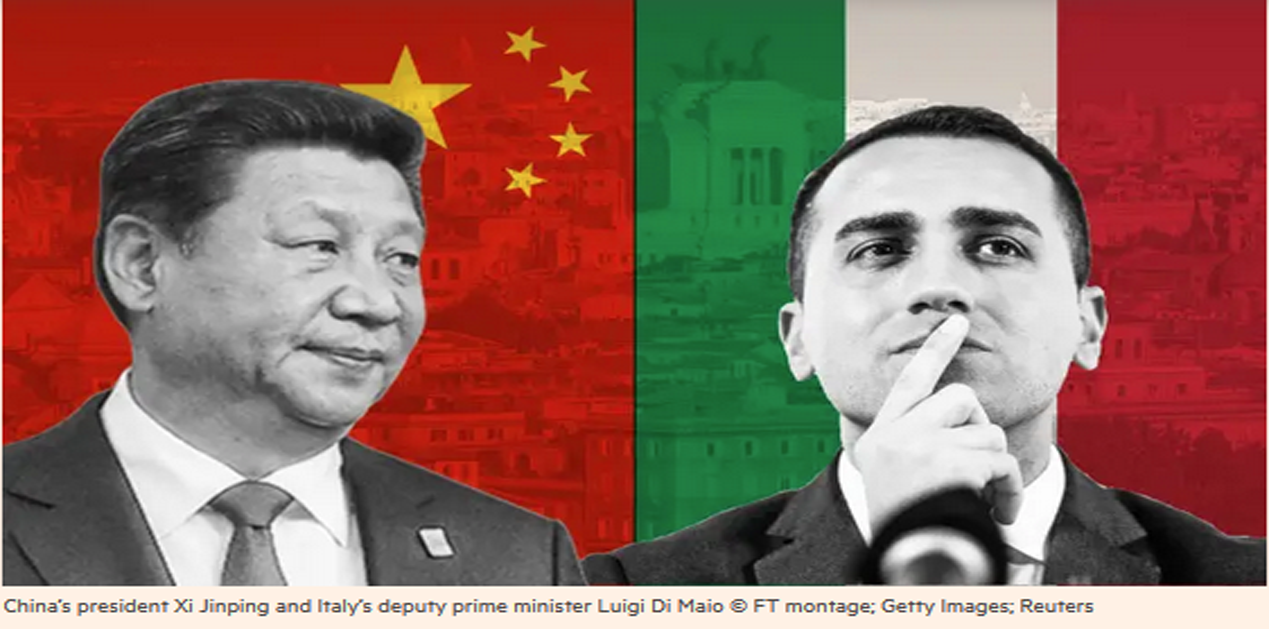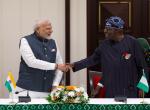The Belt and Road initiative (BRI) has taken a lot of criticism from financial institutions as well from some of the countries which had endorsed it when the project was launched in 2013. While the momentum of the BRI in Asia might have slowed down, Europe seems to be more interested in the Chinese foreign policy initiative which has faced the charge of putting developing countries into “debt traps”. While there is intense debate in Europe about the access given to Chinese companies in mergers and acquisitions of various companies especially in the sphere of technology, Italy has now to endorse the BRI. This raises the question as to whether European Union’s (EU) plans of investment screening process would pass through the EU Parliament.
Italy’s endorsement of BRI would also make it the first country amongst the G-7 members to do so. Other G-7 members like the United States of America, United Kingdom and Japan have expressed their reservations in endorsing Beijing’s flagship project. Rome’s move was motivated by the state of the Italian economy and the constant conflict of interest with the European Central Bank. The endorsement will also have adverse effects on EU’s political and commercial decisions regarding Chinese investments.
Why the Endorsement?
Recent reports show a sudden jump in the yield of the Italian bonds has led to a negative outlook of the economy leading to a bearish sentiment. The change in the sentiment was trending but was validated after the League Party lawmaker Claudio Borghi said the country could leave the EU if there were no changes in the bloc after parliament elections in May. 1
The push to leave EU is being considered by the Italian Government because it is the only country after Greece which has failed to recover from its sluggish growth for ten years. The Italian GDP has fallen to a 0.2 per cent growth rate reaching the same levels as the 2000s. Rome has requested the European Central Bank (ECB) to let the fiscal deficit fall by 2.4 percent of the GDP, as this would enable the economy to shift towards a growth path. However, since this breaches the EU guidelines which is why its budget was rejected. According to Italian economists it is the single European currency that is affecting growth. As per ECB, it is the structural weakness of the economy that is working against Italy. Rome plans to give the same proposal after the EU elections due in May.
Italy’s ten year government bond yields are already on higher risk aversion. 2 The bonds in question are issued by the central banks of every government to collect money and people invest in such bonds because the spread of the yield is uniform for 10 years. The government decides the rate on the basis of its revenue. The rate of the bonds become an indicator of growth. What it means is that the bonds were sold and the yield went up (yield and rate are not the same, as yield is like the money that comes back on the present day rate of the bond minus the opportunity cost of that money) leading people being high risk averse which pushed people to sell their bonds.
The problem Italy is facing is being faced by a lot of European economies such as Spain, which is also in a debt crisis despite its relatively high growth When the domestic economy is really strong the volatility around the world does not have any major impact (an example could be - India and crude oil) but when the domestic economy is weak and the happenings in the world are not favourable then there can be an economic crisis. Fiscal debt has a huge role in both Italy and Spain. Hence, one can expect Spain to also fall in a similar debt crisis in the future and after the election was called, the Spanish bond yields also went up. Similarly, Germany's bond yields also went up slightly, which means a call for elections in EU has affected the European financial markets.3
The pivot towards China could be because Italy has been experiencing a slowdown since 2017 and the economic effect have been aggravated because of sluggish growth with its two major trading partners, Germany and China (major exports being automobiles). Italian economic experts and advisors have blamed the trade tensions between China and the US for the recession in Italy.4
Political Implications for EU
Italy is a founder member of the European Union, the threat to pull out of the supra-national organisation made by parties such as the League would be far more detrimental than the much publicised Brexit. Italy exiting the group will have bigger implications for EU as it is more embedded in the system than the United Kingdom was. The possibility of Italy pushing for an exit though unthinkable till a few years ago, could come about, considering that the Five Star movement, a coalition of Eurosceptic parties, has been constantly making statements stating its displeasure with the EU and ECB. Italy would be the largest economy to back the BRI with the hope that products manufactured in Italy would be exported in “high volumes” into China which is a fast growing market, according to an official in Italy’s ministry for economic development.5
The expectation which Italy might have from China leads to two questions: the question of Debt and the European investment screening process. Italy’s debt is at 130 percent of the total GDP, and the Italian Government has no plan of action to cut its debt.6 Suggestions are divided on ideological lines with one suggesting high-spending policies and while the others want to lower the tax burden. None of the solutions suggested will help with the debt problem. With BRI being criticised on the grounds of creating “debt traps” along with the viability of projects being questioned and cancelled,7 Italy’s endorsement might be out of desperation to inject Chinese investments for the market to stabilise.
The endorsement might also put a question mark on Italy’s compliance with the new European Investment Screening Process, which is intended to be a collective security effort by EU by stopping private or state-owned enterprises from taking ownership of strategic assets in Europe ranging from harbours to investments in energy infrastructure.8 Italy’s support of BRI which through this investment screening process was to be countered will lead to a major political stand-off between the EU and the Italian government.
Italy’s decisions could lead to growing disagreements between EU and China. While Italy has been asking for ECB for reforms, the constant EU intervention through the investment screening process in Italy might at its worst push the Italian parliament to consider of leaving the European Union in order to sustain the investments promised by BRI.
References :
- Furness, Virginia, and Dhara Ranasinghe. "UPDATE 1-Italian Bond Yields Jump as Lawmaker Says Italy May Have..." Reuters. February 15, 2019. Accessed March 2019. https://www.reuters.com/article/eurozone-bonds-italy/update-1-italian-bond-yields-jump-as-lawmaker-says-italy-may-have-to-exit-eu-idUSL5N20A3XJ.
- Ibid.
- Inputs by Rohanshi Vaid, an Economic Expert
- Wearden, Graeme, and Phillip Inman. "Italy Slips into Recession for Third Time in a Decade." The Guardian. January 31, 2019. Accessed March 2019. https://www.theguardian.com/world/2019/jan/31/italy-slips-into-recession-for-third-time-in-a-decade-economy.
- Westcott, Ben. "Italy May Become Largest Economy Yet to Back China's Belt and Road: Reports." CNN. March 06, 2019. Accessed March 2019. https://edition.cnn.com/2019/03/06/europe/china-italy-belt-and-road-intl/index.html.
- Amaro, Silvia. "Italy's Debt Needs to Come Down, EU's Moscovici Says." CNBC. October 11, 2018. Accessed March 2019. https://www.cnbc.com/2018/10/11/italy-debt-needs-to-come-down-eu-moscovici-says.html.
- Griffiths, James. "Are the Wheels Coming off China's Megaproject?" CNN. December 31, 2018. Accessed March 2019. https://edition.cnn.com/2018/12/31/asia/china-kenya-belt-road-bri-intl/index.html .
- Barker, Alex, and Jim Brunsden. "Jean-Claude Juncker's State of the Union Speech, Annotated." US Economy at a Glance. September 13, 2017. Accessed March 2019. https://ig.ft.com/juncker-speech-annotated/.
Image Source: https://www.ft.com/content/29f4814c-467e-11e9-a965-23d669740bfb











Post new comment